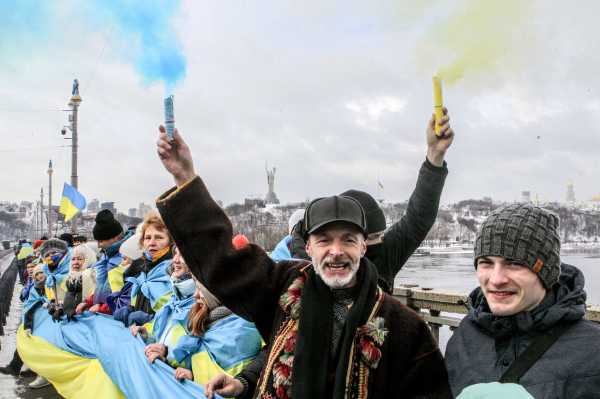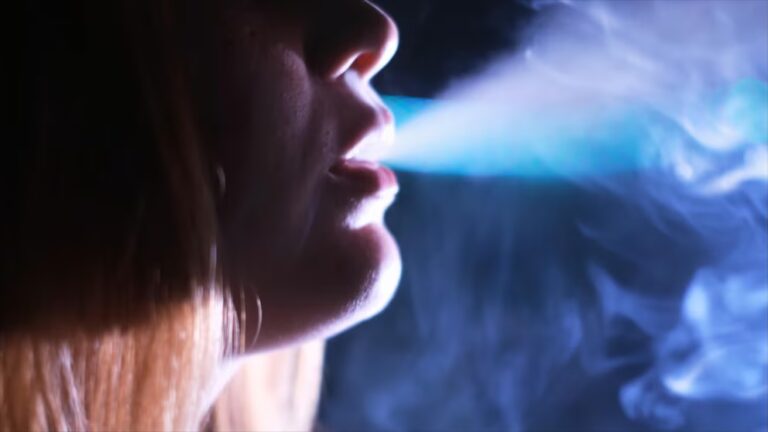
As Russian troops mass on the Ukrainian border and worries of an invasion grow, Russian President Vladimir Putin continues to push a familiar Russian line about the conflict: that Ukraine belongs to Russia and that the two are “one people — a single whole.”
Specifically, much of Russia’s political positioning to launch an incursion into Ukrainian territory is based on Putin’s claim that Ukraine — like Russia, a former Soviet state — is an extension of Russia, the “little brother” that has been led astray by the West and must be reincorporated into the family. Thus, he sees Ukraine’s increasing westward turn as a provocation, by both Ukraine and NATO.
In reality, however, Ukraine has long been distinct from Russia, experts told Vox, and Putin’s current mythologizing of the Russia-Ukraine relationship fits a pattern of falsehoods designed to reconstitute imperial glory, and more importantly, to shield Putin from the threat of democracy in former Soviet republics — and possibly in Russia itself.
That fear informs the potential conflict brewing along the Ukrainian border, Maria Snegovaya, a visiting scholar at George Washington University’s Institute for European, Russian, and Eurasian Studies, told Vox via email.
“It looks like Putin is committed to preventing the deepening cooperation between Ukraine and the US/the West,” Snegovaya said, “which he views as Russia losing Ukraine.”
Snegovaya points to a 2021 essay by Putin, titled “On the Historical Unity of Russians and Ukrainians,” as an example of his thinking.
In the essay, Putin called the two nations “essentially the same historical and spiritual space,” tracing his notion of a shared history back more than a thousand years. That assertion, though, elides a long history of differences between the two countries, and even more significantly, flies in the face of current Ukrainian attitudes, which favor membership in both NATO and the EU, (though neither is likely in the near future).
As talks between the West and Russia are stumbling and military preparations and rhetoric are ratcheting up on the US side, Russia is continuing to spin a false story about cooperation between Ukraine and the West as grounds for a possible invasion, Ukrainian journalist Oleksiy Sorokin told Vox’s Jen Kirby last week.
“This whole notion, this discourse of basically Russia causing an escalation to keep Ukraine out of NATO, is wrong, because Ukraine wouldn’t join NATO in the near future,” Sorokin said. “So this is just like, in Ukraine, this is seen as one of the fake conditions that Russia is trying to bring to justify their aggression. But the real reason for Russian aggression is that Russia denies Ukrainian statehood.”
Putin is clinging to a revisionist history to assert his claim over Ukraine
Russia’s military buildup near Ukraine has increasingly alarmed the US and its NATO partners, for good reason; Ukraine is considered a US ally, and a Russian attempt to reabsorb it would position Russia directly on the border of the European Union, potentially opening the door for future conflict.
One justification Putin has offered for a potential invasion is that Ukraine is historically linked with Russia, and thus Ukraine’s increasing affinity with the US and NATO is provocative. While there’s some logic to the idea that NATO’s eastward expansion can be interpreted as a threat to Russian interests, as Vox’s Jonathan Guyer explained last week, the idea that Ukraine is historically united with Russia doesn’t hold up.
Nonetheless, the idea is deeply embedded in the conflict, Don Jensen, the director for Russia and Europe at the US Institute for Peace, told Vox. According to Jensen, “When Ukraine and Moscow fight about history, it’s about identity for both countries.”
Putin’s argument, as he lays it out in his 2021 essay, hinges on the idea that both nations descend from an early princedom called Kyivan Rus, which encompassed some of modern-day Ukraine and stretched north into the Baltic countries. But the historical ties between that entity and what was then Muscovy — part of modern-day Russia — aren’t particularly significant, and the idea that modern Russia evolved from Kyivan Rus doesn’t carry much weight, Jensen said.
“So when Putin claims that they are the inheritor of the great Slavic lands, consecrated by the Byzantine — now Russian — Orthodox Church, he’s really making a historical claim that’s not particularly true,” he told Vox. “It’s like Texas claiming direct descent from William the Conqueror.”
Ukraine, for its part, is distinct from Russia in many ways and has been influenced by a number of different cultures, including by Central European countries in the west, and present-day Greece and Turkey in the south. Over the centuries Ukraine was also conquered by a number of different groups, including the Mongols, Lithuanians, Poles, Austrians, and Swedes, as well as, eventually, the Russian Empire during the reign of Catherine the Great.
“And that’s where the confusion comes in,” Jensen said, “because on the one hand, there were constant intermarriages between Ukrainians and Russians. But Ukrainian language and culture is noticeably different, and it’s really hard for Russians to get this. As a matter of fact, it’s hard for certain people in certain DC think tanks to get that.”
Although Ukraine had been part of the Russian empire at various points in history, Soviet propaganda cemented the idea, at least in older generations of Ukrainians, that their country was intertwined with the Soviet Union, and indeed was “Little Russia,” as Volodymyr Kravchenko explains in Harvard’s journal of Ukrainian studies, though in reality Ukrainian nationalism existed in some form throughout the 20th century.
In the present day, Putin’s insistence that Russia and Ukraine are historically and “spiritually” the same country allows him to push another narrative — that Ukraine’s openness to joining NATO and increasing alliances with the US and European countries is both a betrayal and somehow disingenuous, a sinister plot to tear the two nations apart.
However, Soviet-era mythologizing — and Putin’s current amplification thereof — of Ukraine as a Russian appendage is powerful. “I don’t think people paid enough attention to all of these changes that were going on in the societies [of former Soviet republics],” Jensen told Vox. “A lot of international relations people in academics and government now are realists, they don’t look at societies very much … they tend to look at just great-power competition. So you end up ignoring the changes inside a society. You also end up dealing with Russia and not dealing with Ukraine,” he said.
Ukraine has been gravitating toward the West for decades
While Ukraine’s westward path has not been a straight line since the dismantling of the Soviet Union, there are some key points in the past 30 years that show the extent to which Ukraine’s vision of itself as a nation is not as Russia’s annex: chiefly, the 1994 Budapest Memorandum, 2004’s Orange Revolution, and the Euromaidan in 2014.
The Budapest agreement saw Ukraine hand over its nuclear weapons to Russia for disposal in exchange for security assurances from the Kremlin, the US, and the UK. Under that agreement, the US assured Ukraine not only that it would respect the country’s borders and sovereignty, but also that it would respond should Russia not abide by the agreement.
Later, the Orange Revolution in 2004 — in which the Kremlin’s preferred candidate, Viktor Yanukovych, lost a closely monitored election held after protests against Yanukovych’s attempt to steal the initial presidential election — marked a turning point in Ukrainian politics, away from Russia and toward democratic institutions. While Yanukovych did eventually come to power in 2010, Ukrainian society had made a decisive break with the past by that point, and pro-democracy reforms in response to the 2004 protests contributed to Yanukovych’s downfall in 2014.
Then, the Euromaidan revolution, which began after Yanukovych backed out of a trade agreement with the EU in 2013, eventually forced Yanukovych to flee to Russia the following year. According to Peter Dickinson, writing for the Atlantic Council, both the Orange Revolution and Euromaidan “underlined Ukraine’s European choice and cemented the country’s rejection of a Russian reunion.”
After the Russian annexation of Crimea in 2014, in the intervening years, Putin’s aggression has “made Ukraine much more self-conscious; he’s pushed it to the West,” Jensen told Vox. “Even if he conquered the country, this would not stop.”
Although Ukraine’s post-Soviet democratic project has been flawed, recent events evince a desire among the Ukrainian people to continue building a stable, functional democracy that cooperates with the West — a desire that’s not just incompatible with Putin’s mythologizing of the ties between Russia and Ukraine, but potentially a threat to Putin’s own hold on power. A fully independent, democratic Ukraine could well signal to Russians that the Putin model isn’t their only option, and that popular uprisings can produce meaningful change.
“I think for [Putin] it’s quite important to prove that no, this democracy is not really genuine, that it’s the West that wants to impose it on the Ukrainians,” Ukrainian journalist Nataliya Gumenyuk told the New Yorker last week. “To admit that societies can do it themselves is to admit that change could be possible in Belarus, in Georgia, and in Russia as well.”
But while Ukraine has made a concerted effort — particularly since the election of President Volodymyr Zelensky in 2019 — to engage with the US and Western institutions, it’s not clear that the West is reciprocating, Snegovaya told Vox.
“Major Western countries visibly lack unity on this issue,” she said. “Germany’s behavior is particularly unacceptable — it has been blocking Estonia’s weapons supplies to Ukraine.”
Last week, Germany refused to allow Estonia to sell German-made weapons to Ukraine under a so-called third-party agreement, frustrating NATO allies and German politicians alike. Germany has been loath to upset its relationship with Russia over the contentious Nord Stream 2 pipeline, making it more cautious than the US, for example, which is allowing Latvia, Estonia, and Lithuania to sell US-made weapons to Ukraine.
Going forward, Snegovaya told Vox, there’s little doubt that Putin will take advantage of the West’s uneven stance on Ukraine to paint a favorable narrative in Russia — similar to how he’s used a misleading narrative about the historical relationship between Russia and Ukraine. “Instead of a message of strength, the alliance communicates a message of weakness,” Snegovaya said, “and Putin, as an experienced, opportunistic player, unquestionably sees that.”
Will you support Vox’s explanatory journalism?
Millions turn to Vox to understand what’s happening in the news. Our mission has never been more vital than it is in this moment: to empower through understanding. Financial contributions from our readers are a critical part of supporting our resource-intensive work and help us keep our journalism free for all. Please consider making a contribution to Vox today.
Sourse: vox.com






